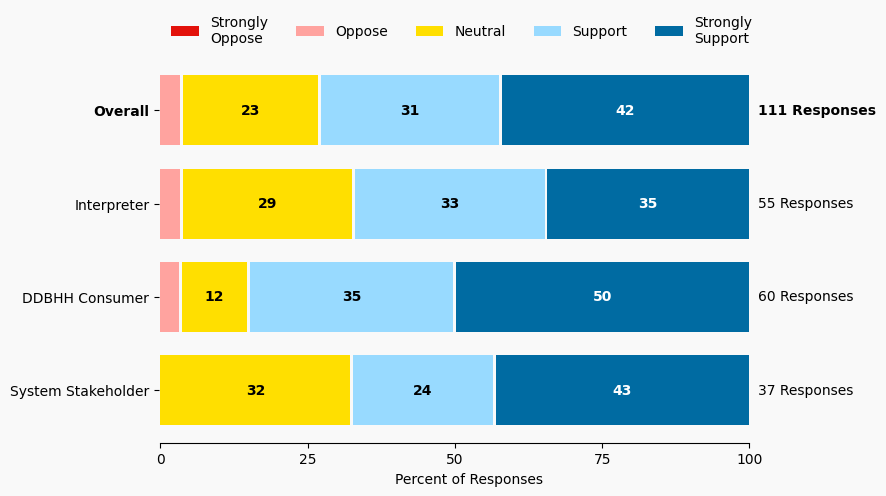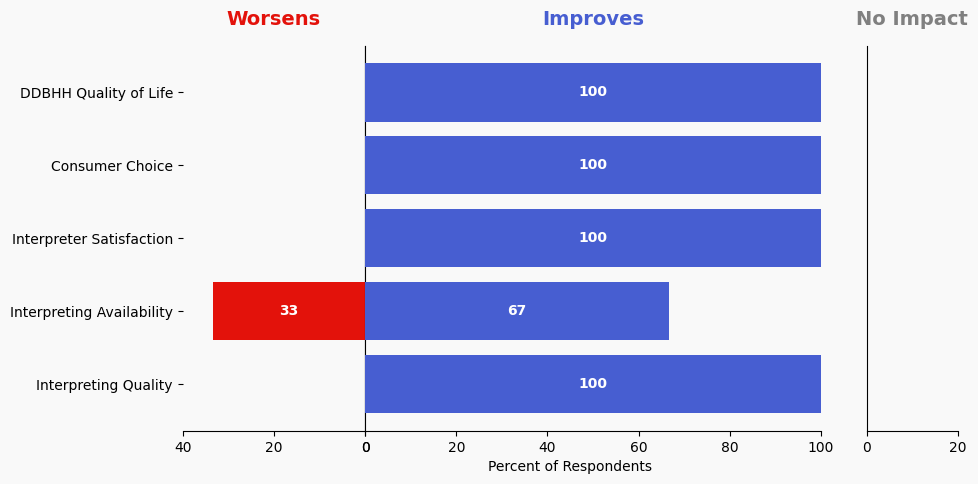80 Pursue Legislation for Automated and Transparent Requests in Health Care Settings
Issue: DDBHH patients – who are the direct consumers of interpreting services – are disconnected from information regarding requests for interpreters for their appointments. This adds a layer of communication for all parties, and this causes greater stress to DDBHH patients.
Proposed Solution: A coalition, with Minnesota Department of Health and the Commission leading, pursue legislation that would mandate automated interpreter request systems within scheduling software for medical providers. Patients could access interpreter request notes (when an interpreter was requested, interpreter’s name when assigned, etc).
Expected outcome: Patients will have better health outcomes due to improved communication access and experience greater confidence and less stress knowing that interpreting services will be provided.
Who is impacted: Consumers, healthcare systems
Timeline: 6 months

Summary of Support Image Description
The stacked bar charts show how respondents rated their level of support and the total number of responses. The percentage for the five support levels is shown from left to right: Strongly Oppose (Dark Red), Oppose (Light Red), Neutral (Yellow), Support (Light Blue), and Strongly Support (Dark Blue).
Respondents may identify with multiple subgroups. The overall level of support is:
Overall
Strongly Oppose: 0%
Oppose: 4%
Neutral: 23%
Support: 31%
Strongly Support: 42%
Click to see the detailed image description for each subgroup.
Interpreter
Strongly Oppose: 0%
Oppose: 4%
Neutral: 28%
Support: 33%
Strongly Support: 35%
DDBHH Consumer
Strongly Oppose: 0%
Oppose: 3%
Neutral: 12%
Support: 35%
Strongly Support: 50%
System Stakeholder
Strongly Oppose: 0%
Oppose: 0%
Neutral: 32%
Support: 24%
Strongly Support: 43%
Overview of Respondents Opting for In-Depth Solution Analysis
No respondents opted in to further assess whether the solution would worsen or improve on five metrics.
Reviewer Evaluation of Solution Effectiveness

Solution Effectiveness Image Description
The stacked bar charts show how respondents assessed the effectiveness of this solution based on five metrics. For each metric, the percentage of respondents is shown from left to right: Worsens (Red), Improves (Blue), No Impact (Gray).
DDBHH Quality of Life
Makes It Worse 0%
Makes It Better 100%
No Impact 0%
Interpreter Satisfaction
Makes It Worse 0%
Makes It Better 100%
No Impact 0%
Consumer Choice
Makes It Worse 0%
Makes It Better 100%
No Impact 0%
Interpreting Availability
Makes It Worse 33%
Makes It Better 66%
No Impact 0%
Interpreting Quality
Makes It Worse 0%
Makes It Better 100%
No Impact 0%
Reviewer Feedback and Insights
Interpreter
One comment from Interpreters suggests informing doctors when they have a DDBHH patient and proposes fines for consistently late doctors, noting the impact on interpreters’ schedules. Another comment sees benefits in centralizing healthcare information to avoid logging into multiple agency accounts for interpreter confirmations. Another comment supports the idea of transparency, allowing consumers to access interpreter request details to ease anxiety and improve accountability.
Deaf, DeafBlind, Hard of Hearing
One comment from DDBHH Consumers highlights concerns around HIPAA, mentioning the reluctance of legislators to impose requirements on medical providers, with Mayo Clinic’s influence also being a factor.
System Stakeholder
No comments were submitted.
PREVIOUS SOLUTION
79 Strengthen Joint Health Commission’s Standards for Provider Accountability and Patient Choice
Issue: The culture and language standards of the Joint Health Commission are not strong or detailed enough to provide protections and best practices for DDBHH patients to have full communication access.
NEXT SOLUTION
81 Establish a Health Care Systems Advisory Board
Issue: Consumers and interpreters need a way to advise hospital systems on successful communication access.
Leave a Reply